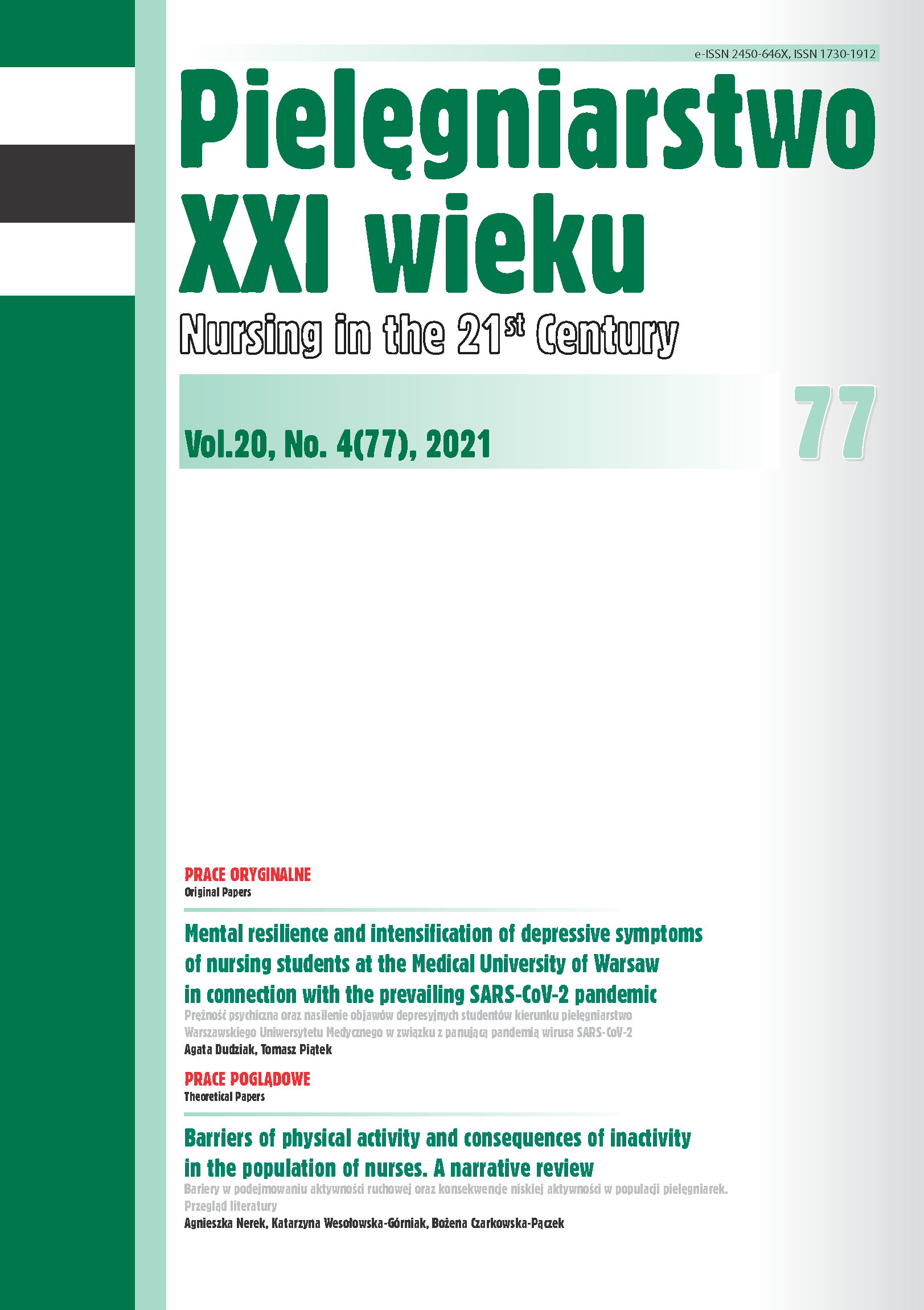The effect of targeted interventions on the unmet needs of healthcare and social support services in patients with progressive neurological disease: interventional control study
DOI:
https://doi.org/10.2478/pielxxiw-2021-0036Keywords:
intervention, need, nurse, progressive neurological disease, supportAbstract
THE EFFECT OF TARGETED INTERVENTIONS ON THE UNMET NEEDS OF HEALTHCARE AND SOCIAL SUPPORT SERVICES IN PATIENTS WITH PROGRESSIVE NEUROLOGICAL DISEASE: INTERVENTIONAL CONTROL STUDY
Introduction. An important priority of provided care is the focus on the quality of life of the patients and their families and care for bio-psycho-social and spiritual needs of the patients.
Aim. The aim was to identify the unmet needs of patients and to determine the impact of targeted interventions on the unmet needs of patients.
Material and methods. The sample consisted of 151 patients with PND. The NPCS questionnaire was used for data collection.
Results. Most unmet needs were identified in the area of rehabilitation, both with respect to frequency (78.8%) as well as intensity (73.5%), family support (52.3%), provision of residential respite care (38.4 %), need of personal care (35.7%), and specialized nursing treatment (33.7%). Targeted intervention reduced the unmet needs in patients included in the interventional study.
Conclusions. Understanding the factors which determine the type and degree of unmet needs of patients with PND is essential for providing suitable multidisciplinary care.
References
1. Kavalieratos D, Corbelli J, Zhang K, et al. Association between palliative care and patient and caregivers outcomes. A systematic review and meta-analysis. JAMA. 2016; 316(20): 2104-2114.
2. Turner-Stokes L, McCrone P, Jackson D, Siegert R. The Needs and Provision Complexity Scale: measuring met and unmet needs in the community for patients with complex neurological disabilities. Neurorehabilitation and Neural Repair. 2013; 3(2): 695-704.
3. Hussain J, Adams D, Campbell C. End-of-life care in neurodegenerative conditions: outcomes of a specialist palliative neurology service. International Journal of Palliative Nursing. 2013; 19(4), 162-169.
4. Lageman S, Cash T, Mickens M. Patient-reported needs, non-motor symptoms and quality of life in essential tremor and Parkinson’s Disease. Tremor and Other Hyperkinetic Movements. 2014; 4(240): doi: 10.7916/D8RF5S4J.
5. Mansfield E, Boyes AW, Sanson-Fisher R. Quantifying the unmet needs of caregivers of people with dementia: A critical review of the quality of measures. International Journal of Geriatric Psychiatry. 2017; 32(3): 274-287.
6. Van der Eijk M, Faber M, Shamma S, Munneke M, et al. Moving towards patient-centered healthcare for patients with Parkinson’s disease. Parkinsonism & Related Disorders. 2011; 17(5): 360-364.
7. Asadi Lari M, Tamburini M, Gray D. Patients’ needs, satisfaction, and health related quality of life: towards a comprehensive model. Health Quality of Life Outcomes. 2004; 2(32): 1-15.
8. Calvert M, Pall H, Hoppitt T, et al. Health-related quality of life and supportive care in patients with rare long-term neurological conditions. Quality Life Research. 2013; 22(6): 1231-1238.
9. McColl MA, Jarzynowska A, Shortt S. Unmet health care needs of people with disabilities: population level evidence. Disability & Society. 2010; 25(2): 205-218.
10. Anderson F, Downing GM, Hill J, et al. Palliative performance scale (PPS): a new tool. Journal of Palliative Care. 1996; 12(1): 5-11.
11. Mahoney FI, Barthel D. Functional evaluation: the Barthel index. Maryland State Medical Journal. 1965; 14: 56-61.
12. Waller A, Girgis A, Lecathelinas Ch, et al. Palliative care research program, validity, reliability and clinical feasibility of a Needs Assessment Tool for people with progressive cancer. Psychooncology. 2010; 19(7): 726-733.
13. Hansen D, Larsen P, Holm L, et al. Association between unmet needs and quality of life of cancer patients: A population-based study. Acta Oncologica. 2013; 52(2): 391-399.
14. Siegert R, Jackson D, Turner-Stokes L. The Needs and Provision Complexity Scale: a first psychometric analysis using multicentre data. Clinical Rehabilitation. 2014; 8(7): 687-695.
15. Buetow S, Giddings L, Williams L, et al. Perceived unmet needs for health care among Parkinson’s Society of New Zealand members with Parkinson’s disease. Parkinsonism & Related Disorders. 2008; 14(6): 495-500.
16. Lee J, Kim Y, Kim S, et al. Unmet needs of people with Parkinson’s disease: A cross‐sectional study. Journal of Advanced Nursing. 2019; 75(12): 3504-3514.
17. Van Walsem M, Howe E, Ruud G, et al. Health-related Quality of Life and Unmet Healthcare Needs in Huntington’s Disease. Health and Quality of Life Outcomes. 2017; 7(15): 1-6.
18. Holmoy A, Johannssen C, Hope S, et al. Uncovering health and social care needs among myotonic dystrophy patients. Acta Neurologica Scandinavica, 2019; 139(6): 526-532.
Downloads
Published
Issue
Section
License
Copyright (c) 2021 Authors

This work is licensed under a Creative Commons Attribution-NonCommercial-NoDerivatives 4.0 International License.




